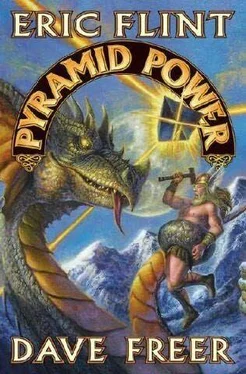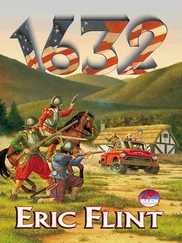Eric Flint - Pyramid Power
Здесь есть возможность читать онлайн «Eric Flint - Pyramid Power» весь текст электронной книги совершенно бесплатно (целиком полную версию без сокращений). В некоторых случаях можно слушать аудио, скачать через торрент в формате fb2 и присутствует краткое содержание. Жанр: Фэнтези, на английском языке. Описание произведения, (предисловие) а так же отзывы посетителей доступны на портале библиотеки ЛибКат.
- Название:Pyramid Power
- Автор:
- Жанр:
- Год:неизвестен
- ISBN:нет данных
- Рейтинг книги:5 / 5. Голосов: 1
-
Избранное:Добавить в избранное
- Отзывы:
-
Ваша оценка:
- 100
- 1
- 2
- 3
- 4
- 5
Pyramid Power: краткое содержание, описание и аннотация
Предлагаем к чтению аннотацию, описание, краткое содержание или предисловие (зависит от того, что написал сам автор книги «Pyramid Power»). Если вы не нашли необходимую информацию о книге — напишите в комментариях, мы постараемся отыскать её.
Pyramid Power — читать онлайн бесплатно полную книгу (весь текст) целиком
Ниже представлен текст книги, разбитый по страницам. Система сохранения места последней прочитанной страницы, позволяет с удобством читать онлайн бесплатно книгу «Pyramid Power», без необходимости каждый раз заново искать на чём Вы остановились. Поставьте закладку, и сможете в любой момент перейти на страницу, на которой закончили чтение.
Интервал:
Закладка:
Gjallarhorn: "Yelling horn." The great horn with which the god Heimdall will call all of the?sir's allies to war at Ragnarok. Also indicated in the eddic poem "Grimnismal" as Heimdall's drinking horn.
Goin: One of the snakes who creep around Yggdrasil.
Gram: "Wrath." The sword of the hero Sigurd, supposedly so strong it could split an anvil, yet so sharp it could split a hank of wool drifting against the blade in the river current. Supposedly forged with all the skill and magic that the dwarf Reginn could impart, from the remains of Sigurd's father's legendary sword.
Grid: "Greed." A friendly giantess, who got really friendly with Odin, and also lent Thor a belt of strength, iron gauntlets and "Grid's rod," a staff of iron that had various magical properties.
Grotti: The magical handmill (powered by two giantesses) which ground out whatever you ordered it to.
Gungnir: "Swaying one." Odin's magical spear, supposed never to miss its target, which was made for him by the dwarves-the sons of Ivaldi-and given as a gift to the?sir when Loki went to see them for new hair for Thor's wife Sif.
Heimdall: The gate-guard of Asgard, Heimdall has gold teeth and a historical feud with Loki. He is supposed to have immensely keen vision, and a horn that can be heard across the nine worlds. In the Norse myth way of balancing things, he is Loki's counterpart, and the two are supposed to kill each other at Ragnarok. Heimdall is given the credit for setting up the order of men, determining (by birth) if they should be noblemen, farmers, or slaves. It seemed a good reason to make him a villain.
Hel: The name applies to both the kingdom and the queen-goddess of the dead. Hel is supposed to be a daughter of Loki and Angbroda. She is half black and half white, and gets all the dead who do not die in combat.
Helblindi: "Helblind." One of the many names for Odin. Also listed in one source as a brother of Loki.
H?nir: The one-time companion of Odin, who is supposed to have actually been the one to give life to the first humans, Ask and Embla, who were tree-trunks before that. One of the two hostages sent by the ?sir to dwell among the Vanir. His fellow hostage Mirmir got his head chopped off because H?nir couldn't say a word without asking Mirmir first.
Hrimner: "Frosty." A giant.
Hugin: "Thought." One of Odin's two ravens, who fly around spying for the boss.
Idun: A goddess. The wife of the god of poetry, Bragi. The custodian of the apple of youth and supposedly as fair as spring. Her apples are purported to restore youth and health. In return for his freedom, Loki once lured her outside of Asgard and into the clutches of the giant Thjazi (the father of Skadi). Eventually Loki is prevailed upon to rescue her, which he does in falcon form, transforming Idun into a nut and carrying her in his claws. The pursuing Thjazi is killed. In the Lokasenna, Loki accuses Idun of having sex with her brother's killer.
Jormungand: The Midgard Serpent. A dragon, supposedly the child of Loki and Angbroda, whom Odin cast into the sea, where it grew so large that it encircled the world.
Jotunheim: The home of giants in Utgard.
Kvasir's mead: Also called the mead of inspiration, brewed with honey mixed with the blood of the vastly wise Kvasir-a man created by the mixed spittle of the?sir and Vanir, who was murdered by two dwarves. The brew thus created gave such cunning to the tongues of the dwarves that they were able to trick a giant and his wife into being murdered too. There their luck ran out because the giant's son, Suttung, came along and marooned them on a rock. In exchange for their liberty and survival, the mead changed hands. Suttung kept it under tight guard by his daughter, in a locked cave, but Odin gained entry to the place, seduced the daughter and stole the mead. (You don't want to know the details. It's too gross for modern tastes. The mead would be too.)
Loki: Loki is one of the most confusing figures in all of Norse myth. It is apparent that both his role and popularity changed with the passage of time, with his final demonization occurring in the thirteenth century when Snorri Sturluson in his collation of myth (in which he did some sterling work-and also took some large liberties) used Loki as the chief bad guy to blame for everything. Snorri was collecting myths in Iceland, where Christianity had been the religion for a few centuries.
Some things are certain about Loki. First, he was a trickster. Second, he was as much at home among the giants as among the?sir. Third, although his frequently thoughtless mischief plunged him and the?sir into trouble, he never failed to extricate them from it. He got precious little thanks for the latter, despite his role in saving Freyja (twice) and his role in recovering Thor's hammer, or the treasures of the?sir.
Loki differs from the bulk of the?sir in a couple of notable ways. For one, he is one of the giants and never claimed to be anything else. For a second he is referred to in matrilineal terms as "Son of Laufey" (Laufey = leafy, his mother's name) which is in direct contrast to normal Norse tradition. Third, it appears that Norse society (in contrast to the Ancient Greeks of Pyramid Scheme) was homophobic. Loki, by being the mare that lured the giant builder's stallion away (so that the?sir did not have to pay the giant) "played a woman's part" and gave birth to the horse Sleipnir, whom Odin seems to have had no moral qualms about appropriating. The origins of his name have been associated with both fire (logi) and air (loft).
Minni-toast: The toast to the dead. The last toast drunk in the evening.
Mjollnir: "Lightning." Thor's hammer, created by the dwarf Sindri, one of the sons of Ivaldi. It would never miss and never fail to find its way back to his hand.
Munin: "Memory." Odin's other raven spy.
Myrkvid: Mirkwood. A lot of Tolkien is drawn from Norse sources. The forest that borders Muspellheim dividing it from Midgard.
Naglfar: The corpse-ship. Made from the nails of the dead, it will carry the dead from Hel to Ragnarok.
Nagrind: "Corpse-gate." The entry to Hel's kingdom.
Njord: One of the Vanir hostages. Chosen as a bridegroom (on the basis of his feet) by the giantess Skadi, in recompense for the?sir killing her father. He is a sea divinity, which makes the kenning from Loki's flyting make sense. "The daughters of the giant Hymir use his mouth as a pisspot." Hymir being a mountain giant, his "daughters" are the rivers off that mountain, which then empty into the sea. His relationship with Skadi produced Frey and Freyja, but considerable marital discord, as Skadi wanted to live in the mountains in her father's castle, and Njord wanted to live in his seaside home. In theory they settled for a week in each, but the relations frayed and they went back to separate lives. Skadi is later cited as one of Odin's bits of fluff on the side.
Norns: Three women-Urd (past), Verdani (present), and Skuld (future, or literally "debt")-who chart the destiny of all of mankind. Found hanging out at Urd's well, at the foot of the world tree.
Odin: Generally considered the top god in Norse mythology. He is also a serial adulterer, oathbreaker, thief, liar and self-serving creep. Sometimes known as "evil-worker." Odin's character can scarcely be described as reliable. He is obsessed with the collection of knowledge, which to the biased observer looks like "how do I preserve number one?" If this incidentally involves the safekeeping of Asgard, that's a good reason to do very nearly anything. Known for traveling among men in his wide hat and blue cloak, the one-eyed wanderer has misled many to their doom, and helped others whom, as Loki points out in the Lokasenna, one can see no justification for helping. Odin claims the reasons for his lies, adultery and murderous "help" are beyond the understanding of ordinary gods. It's for their benefit, really. Among Odin's varied deeds include his spending nine days hanging from Yggdrasil with the dead sacrifices, to learn the runes, giving one eye for a drink from Mirmir's well (supposed to confer wisdom), and also seducing the giantess Gunnlod to get the mead of poetry. He is accompanied by two ravens and keeps two wolves to feed on his table scraps.
Читать дальшеИнтервал:
Закладка:
Похожие книги на «Pyramid Power»
Представляем Вашему вниманию похожие книги на «Pyramid Power» списком для выбора. Мы отобрали схожую по названию и смыслу литературу в надежде предоставить читателям больше вариантов отыскать новые, интересные, ещё непрочитанные произведения.
Обсуждение, отзывы о книге «Pyramid Power» и просто собственные мнения читателей. Оставьте ваши комментарии, напишите, что Вы думаете о произведении, его смысле или главных героях. Укажите что конкретно понравилось, а что нет, и почему Вы так считаете.











